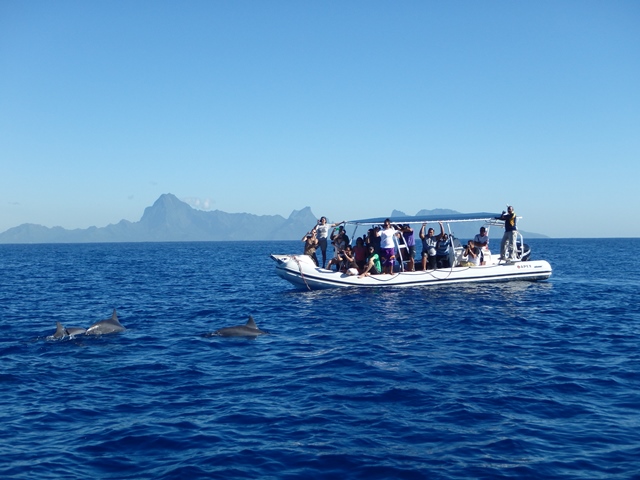
Island and Ocean Ecosystems
Pacific Biodiversity Blue Belt is a two and a half year project to enhance integrated ocean management and marine biodiversity conservation in New Caledonia, Wallis and Futuna, French Polynesia and Pitcairn Islands Overseas Countries and Territories (OCTs).
The project aims to coordinate national activities and provides financial support to help the four OCTs to implement their Marine Protected Areas (MPA's) actions, put into use the appropriate technology for surveillance and monitoring of the MPAs, and develop good ecotourism practices.
Launched in May, 2016, the Pacific Biodiversity Blue Belt is implemented by the Secretariat of the Pacific Regional Environment Programme (SPREP) in partnership with the French Agency for Biodiversity (AFB) and benefits from a European Commission BEST 2.0 "Medium-sized Grant".

French Polynesia
One of the objectives of the project is to empower the development of locally appropriate methods for design and implementation of MPAs through strengthened Marine Spatial planning or Strategic Regional Analysis in MPA planning and design.
The project supports the Direction des Affaires Maritimes (Directorate of Maritime Affaires, Government of New Caledonia) in its drafting process of the Coral Sea Nature Park management plan by funding its public consultation operation, "Les calédoniens ont la parole" ("The Caledoniens have the floor"), gathering the opinion of as many citizens as possible.
In line with this, SPREP partnered with the AFB to coordinate a five day Pacific Region Sustainable Oceans Initiative and Pacific Ocean Alliance Workshop in November last year which brought together over 70 participants from across 18 countries. This resulted in training and support for integrated ocean management, MSP, surveillance and enforcement at national and regional levels.
A meeting in June this year about MSP between Wallis & Futuna, Loyalty province government services and AFB was also organised to better coordinate the delivery of services to Pacific island countries and territories, to train and to build skills, which has been at the core of the Pacific Biodiversity Blue Belt.
"Marine Spatial Planning and Strategic Regional Analysis in MPA planning and design is crucial," said Ms Artzner.
As competition for maritime space and its resources increases, these regional and multi-sectoral approaches help Marine Protected Areas managers ensure human activities take place in a coherent, safe and sustainable way and that pressures on ecosystems and their impacts are identified early and regulated.
Costal and underwater trails activities are also going to be implementing in the OCTs to promote better environmental education and ecotourism good practices.
The Project will span from 2016 to end of 2018 and is implemented by the Secretariat of the Pacific Regional Environment Programme (SPREP) in partnership with the French Agency for Biodiversity (AFB) and benefitting from a European Commission BEST 2.0 "Medium-sized Grant" totalling EUR 399,897.
For further information please contact Ms Flora Artzner at [email protected]
The project aims to coordinate national activities and provides financial support to help the four OCTs to implement their Marine Protected Areas (MPA's) actions, put into use the appropriate technology for surveillance and monitoring of the MPAs, and develop good ecotourism practices.
Launched in May, 2016, the Pacific Biodiversity Blue Belt is implemented by the Secretariat of the Pacific Regional Environment Programme (SPREP) in partnership with the French Agency for Biodiversity (AFB) and benefits from a European Commission BEST 2.0 "Medium-sized Grant".

French Polynesia
One of the objectives of the project is to empower the development of locally appropriate methods for design and implementation of MPAs through strengthened Marine Spatial planning or Strategic Regional Analysis in MPA planning and design.
The project supports the Direction des Affaires Maritimes (Directorate of Maritime Affaires, Government of New Caledonia) in its drafting process of the Coral Sea Nature Park management plan by funding its public consultation operation, "Les calédoniens ont la parole" ("The Caledoniens have the floor"), gathering the opinion of as many citizens as possible.
In line with this, SPREP partnered with the AFB to coordinate a five day Pacific Region Sustainable Oceans Initiative and Pacific Ocean Alliance Workshop in November last year which brought together over 70 participants from across 18 countries. This resulted in training and support for integrated ocean management, MSP, surveillance and enforcement at national and regional levels.
A meeting in June this year about MSP between Wallis & Futuna, Loyalty province government services and AFB was also organised to better coordinate the delivery of services to Pacific island countries and territories, to train and to build skills, which has been at the core of the Pacific Biodiversity Blue Belt.
"Marine Spatial Planning and Strategic Regional Analysis in MPA planning and design is crucial," said Ms Artzner.
As competition for maritime space and its resources increases, these regional and multi-sectoral approaches help Marine Protected Areas managers ensure human activities take place in a coherent, safe and sustainable way and that pressures on ecosystems and their impacts are identified early and regulated.
Costal and underwater trails activities are also going to be implementing in the OCTs to promote better environmental education and ecotourism good practices.
The Project will span from 2016 to end of 2018 and is implemented by the Secretariat of the Pacific Regional Environment Programme (SPREP) in partnership with the French Agency for Biodiversity (AFB) and benefitting from a European Commission BEST 2.0 "Medium-sized Grant" totalling EUR 399,897.
For further information please contact Ms Flora Artzner at [email protected]